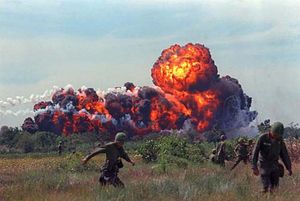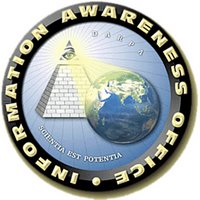The Fog of War

Just wanted to share a very very good documentary that you can watch in its entirety on google video. The documentary is Errol Morris' The Fog of War. It's basically a 2 hour interview with Robert McNamara, Secretary of Defense in the Kennedy administration, one of the architects of the Vietnam war. A really fascinating and likeable guy, and suprisingly sharp for an 85 year old. Sit back and soak up McNamara's rules of war gained from a lifetime of experience as a strategist. Too bad he's not in charge of the Department of Defense today, I'm pretty sure he'd be a vast improvement.
From Wikipedia, here's a list of McNamara's lessons:
The film's eleven lessons
1. Empathize with your enemy.
2. Rationality will not save us.
3. There's something beyond one's self.
4. Maximize efficiency.
5. Proportionality should be a guideline in war.
6. Get the data.
7. Belief and seeing are both often wrong.
8. Be prepared to reexamine your reasoning.
9. In order to do good, you may have to engage in evil.
10.Never say never.
11.You can't change human nature.
McNamara's additional ten lessons
These were written as a companion to the film and were included in the Special Features of the DVD.
1. The human race will not eliminate war in this century but we can reduce war, the level of killing, by adhering to the principles of a just war, in particular of proportionality.
2. The indefinite combinations of human fallibility and nuclear weapons will lead to the destruction of nations.
3. We are the most powerful nation in the world - economically, politically, and militarily - and we are likely to remain so for decades ahead. But we are not omniscient.
4. If we cannot persuade other nations with similar interests and similar values of the merits of the proposed use of that power, we should not proceed unilaterally except in the unlikely requirement to defend the continental US, Alaska and Hawaii.
4.Moral principles are often ambiguous guides to foreign policy and defense policy, but surely we can agree that we should establish as a major goal of U.S. foreign policy and, indeed, of foreign policy across the globe : the avoidance in this century of the carnage--160 million dead--caused by conflict in the 20th century.
5. We, the richest nation in the world, have failed in our responsibility to our own poor and to the disadvantaged across the world to help them advance their welfare in the most fundamental terms of nutrition, literacy, health, and employment.
6. Corporate executives must recognize there is no contradiction between a soft heart and a hard head. Of course, they have responsibilities to their employees, their customers and to society as a whole.
7. President Kennedy believed a primary responsibility of a president--indeed "the" primary responsibility of a president--is to keep the nation out of war, if at all possible.
8. War is a blunt instrument by which to settle disputes between or within nations, and economic sanctions are rarely effective. Therefore, we should build a system of jurisprudence based on the International Court--that the U.S. has refused to support--which would hold individuals responsible for crimes against humanity.
9. If we are to deal effectively with terrorists across the globe, we must develop a sense of empathy--I don't mean "sympathy" but rather "understanding" to counter their attacks on us and the Western World.
10. One of the greatest dangers we face today is the risk of mass destruction as a result of the breakdown of the Non-Proliferation Regime. We--the U.S. are contributing to that breakdown.
11 Lessons from Vietnam
The origin of the film's lesson concept, these eleven came from McNamara's book In Retrospect: The Tragedy and Lessons of Vietnam:
1. We misjudged then — and we have since — the geopolitical intentions of our adversaries … and we exaggerated the dangers to the United States of their actions.
2. We viewed the people and leaders of South Vietnam in terms of our own experience … We totally misjudged the political forces within the country.
3. We underestimated the power of nationalism to motivate a people to fight and die for their beliefs and values.
4. Our judgments of friend and foe alike reflected our profound ignorance of the history, culture, and politics of the people in the area, and the personalities and habits of their leaders.
5. We failed then — and have since — to recognize the limitations of modern, high-technology military equipment, forces and doctrine…
6. We failed as well to adapt our military tactics to the task of winning the hearts and minds of people from a totally different culture.
7. We failed to draw Congress and the American people into a full and frank discussion and debate of the pros and cons of a large-scale military involvement … before we initiated the action.
8. After the action got under way and unanticipated events forced us off our planned course … we did not fully explain what was happening and why we were doing what we did.
9. We did not recognize that neither our people nor our leaders are omniscient. Our judgment of what is in another people's or country's best interest should be put to the test of open discussion in international forums. We do not have the God-given right to shape every nation in our image or as we choose.
10. We did not hold to the principle that U.S. military action … should be carried out only in conjunction with multinational forces supported fully (and not merely cosmetically) by the international community.
11. We failed to recognize that in international affairs, as in other aspects of life, there may be problems for which there are no immediate solutions … At times, we may have to live with an imperfect, untidy world.
Underlying many of these errors lay our failure to organize the top echelons of the executive branch to deal effectively with the extraordinarily complex range of political and military issues.
wow...doesn't that last list sound familiar? ;-)






0 Comments:
Post a Comment
<< Home